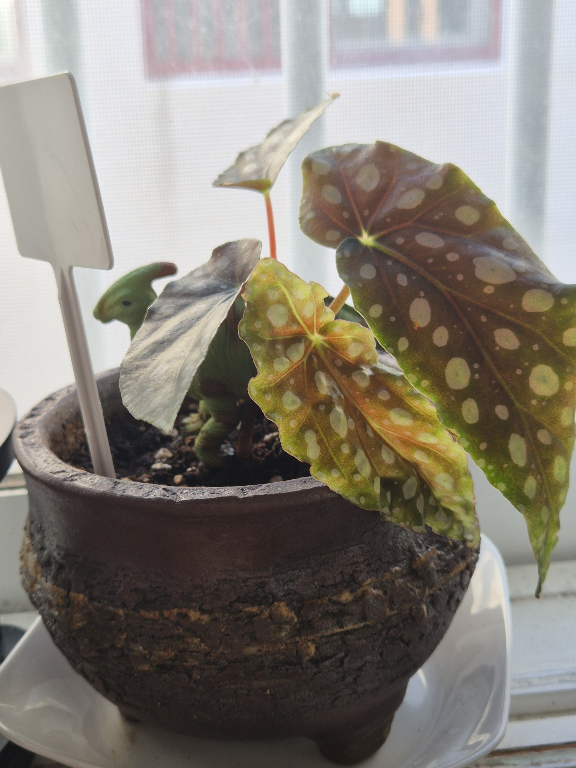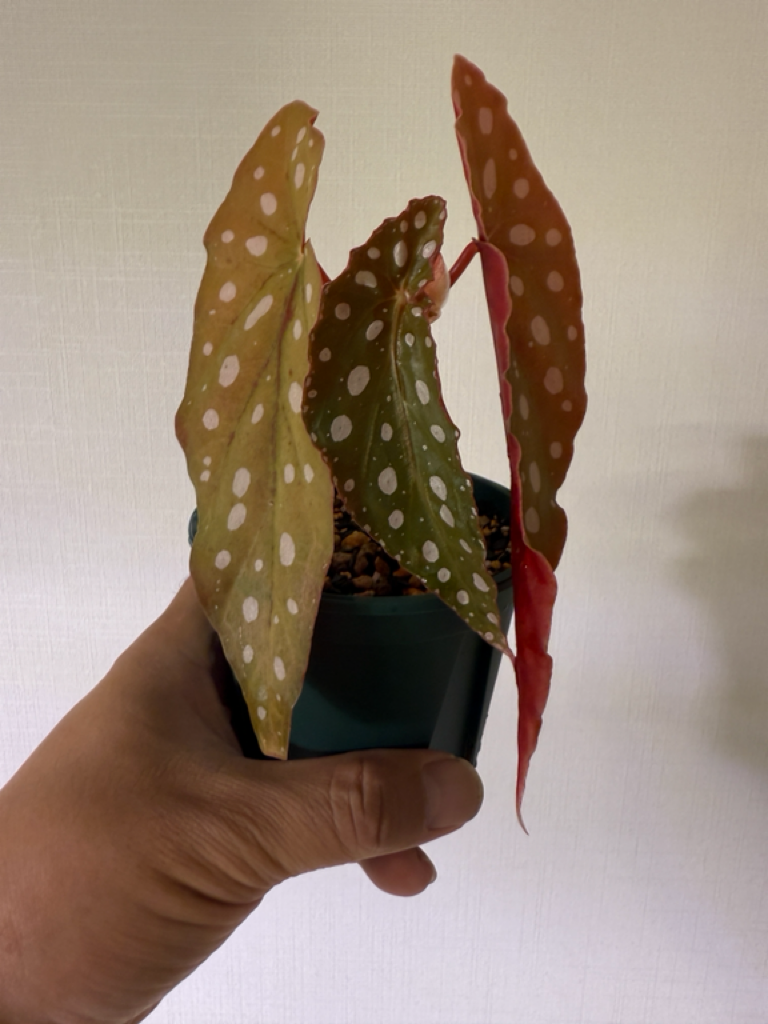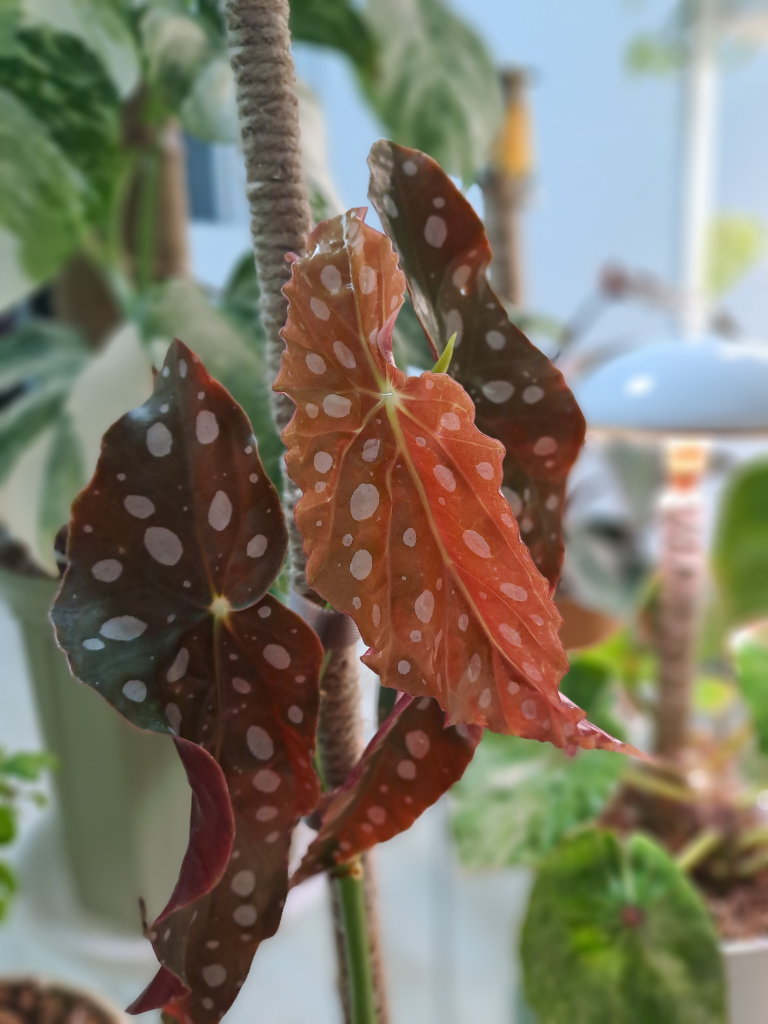How to grow and care for Begonia maculata
plant care guide about watering, fertilizing, trimming, repotting, cutting, propagating Begonia maculata
Begonia maculata 101 - Plant Care Instructions
Bright direct light
18C° ~25C°
Every 7 days
Growth Observation wiki
Botany Encyclopedia
Species : Begonia maculata
🏝️ Habitat Conditions
It primarily inhabits Northeast Asia and thrives in shady, humid environments with wetlands.
🪨 Soil Mix
It is best to plant in well-draining soil. A common mix ratio is 40% potting soil, 20% bark, 20% leaf mold, 10% perlite, and 10% charcoal. This can vary depending on conditions and environment.
🌡️ Environment
Maintain daytime temperatures between 20-25°C and nighttime temperatures between 10-15°C. Keep humidity levels between 40-70% for a moist environment. Ensure good air circulation to prevent mold and pests, which can occur if humidity is high but air circulation is poor.
☀️ Light
It is best to grow in a shaded area without direct sunlight.
💧 Water
From spring to fall, water the plant when the surface soil dries out, keeping the soil consistently moist. In winter, water when the inner soil dries out.
🌱 Propagate
Propagation is mainly done through cuttings. For cuttings, use sterilized tools to cut 10-20 cm branches at an angle. Let them dry for 3-4 hours, then place them in soil or water for propagation. 1. For water propagation, avoid transparent containers. Place the stem in water, and once roots appear, use hydroponic fertilizer. If roots are 5-7 cm or longer, transfer to soil. 2. For soil propagation, plant deeply in soil without fertilizer. After taking cuttings, avoid exposing them to bright light. Gradually increase light exposure to help them adapt to gentle light. Maintain high humidity and keep the temperature between 20-25°C.
🪴 Repot
Repot in spring every 1-2 years due to its relatively fast growth rate.
💊 Fertilize
Fertilizer is not needed much, but using it at the recommended amount from spring to summer can promote more vigorous growth. After repotting, it is best to wait 2-4 weeks before applying fertilizer.
🌺 Flower
If exposed to too much light, the plant will not bloom. It's better to place it in a shaded area where it can receive indirect light. The plant blooms from summer to fall.
water
How to water Begonia maculata
How often should I water?
check Begonia maculata Every 7 days if it needs water when it’s very cold (below 5℃), water less frequently
When do I need to water?
the top 2-3 inches of soil is dry
Light & Location
How much light does a Begonia maculata need?

Bright direct light
Bright indirect light
Grow light
Light preference
Begonia maculata likes Bright direct light, Bright indirect light, Grow light day. The brighter the space, the better this plant grows.
Check if there’s an optimal place in your house!
This plant prefers
2K ~ 20K lux to thrive!
0
20K~
2K
20K
Temperature
Houseplants
-15
18~25℃
45
Plants that grow in the wild and those that grow indoors prefer different temperatures. If you grow Begonia maculata at home, make sure the temperature is 18~25℃.
Humidity
Ideal humidity
0
40~70%
100
Begonia maculata prefers humidity about 40~70%. If necessary, increase humidity by misting, humidifier.
Fertilize
Collective Knowhow
When should I fertilize?
Only when your plant is healthy
How frequently should I fertilize?
1-2 times in growing season. A pinch for a small pot.
Characteristic
The taxonomic classification of Begonia maculata is as follows. - Kingdom: Plantae, Phylum: Tracheophyta, Class: Magnoliopsida, Order: Cucurbitales, Family: Begoniaceae, Genus: Begonia, Species: Begonia maculata
| Characteristic Name | Characteristic Value |
|---|---|
| Habitat | South America |
| Taxonomy Name | Taxonomy Value |
|---|---|
| Phylum | Tracheophyta |
| Class | Magnoliopsida |
| Order | Cucurbitales |
| Family | Begoniaceae |
| Genus | Begonia |
| Species | Begonia maculata |
Is your plant sick?
Track what happened. We’ll let you know the cause and treatment shortly!





1:1 Expert Help
You’ll get professional feedback within 24 hours from an expert on our team.
feedback will include















